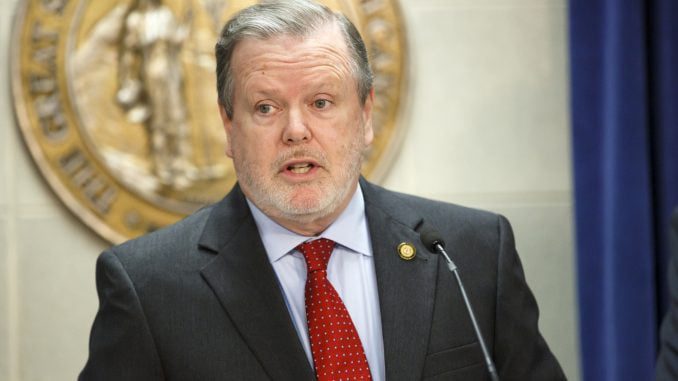
RALEIGH — Taxpayers in N.C. will soon learn whether they will receive an unprecedented tax rebate from the state’s coffers.
Senate leader Phil Berger (R-Eden) has floated the prospect of returning a portion of the state’s $896.7 million budget surplus to taxpayers. The idea emerged from the ongoing budget gridlock between the Republican-led General Assembly and Democratic Gov. Roy Cooper, who vetoed the $23.9 billion spending plan lawmakers sent to him.
It’s uncertain what percentage of the tax overcollections could be channeled to rebates.
“Those are the calculations that we’re running now to see what that even looks like,” said Berger spokesman Pat Ryan. No target figures have been identified for how much money might be returned to taxpayers’ pockets.
“It could be a few hundred bucks per couple, or per taxpayer. There’s so many different variables that that’s like one back of the envelope calculation,” Ryan said.
Senate budget analysts are crunching numbers under different scenarios to determine the best plan. Issuing a rebate would require legislation separate from the budget bill. It’s unclear whether Cooper would support such a move or veto it. He didn’t respond to a request for comment.
“I hope he [and Democratic lawmakers] wouldn’t take the position that there’s going to be no spending or budget decisions made in this state whatsoever until there’s Medicaid expansion,” Ryan said.
Cooper has said he won’t negotiate a budget compromise unless the General Assembly votes to expand Medicaid, which could add 500,000 able-bodied adults to the federal health program. The standoff has lingered after Cooper’s June 28 veto of the budget bill because Republicans don’t have enough Democrat votes in the House to override the veto. The state is operating under a continuation budget set at the previous year’s levels.
“In terms of the mechanics of how the checks get written or sent out, that’s why this takes a little while to work through what it looks like, and whether it’s workable. Those are questions we’re trying to answer now,” Ryan said. “Then we need to speak to the caucus, so [it will be] probably a matter of weeks, not months,” until a decision is reached.
Ryan, the legislative Fiscal Research Division, and longtime former General Assembly special counsel Gerry Cohen said they cannot recall a state tax rebate ever being issued.
A news release from Senate Majority Leader Harry Brown (R-Onslow) cited Fiscal Research Division data showing personal income tax final payments exceeded expectations by $150 million. That stems from 2.7% personal income growth that led the Southeast last year. Sales tax collections were $74 million higher than anticipated.
Cohen said lawmakers would have to grapple with logistical issues to rebate any surplus.
“Which people do you rebate to? The simplest way rather than sending people checks, which can cost some money, is to have a short-term cut in a rate, like cutting the state sales tax” for a limited period of time, Cohen said. That would push money back to taxpayers in a stimulus fashion that could further boost the economy without choosing specific groups of winners and losers.
On the fiscal balance sheets a short-term cut in a particular tax rate has the same effect as sending checks in the mail, and costs less.
But it would be impossible to determine who paid sales taxes, and whether the short-term advantages would be spread in proportion to how much they paid.
For that reason, some might prefer an income tax rebate. That, too, has complications.
“Do you send checks to everybody who actually owed any money last year? A lot of them may not be here anymore,” Cohen said. Mailing checks would incur an administrative cost.
House Speaker Tim Moore (R-Kings Mountain) is not ruling out a tax rebate.
“Since the projected surplus figures were recently revised upward again, and budget funds remain blocked by the Governor’s veto, it’s one of a number of proposals lawmakers could consider to appropriate the hundreds of millions of dollars the state collected in revenue over expectations,” said Moore spokesman Joseph Kyzer.
“Given the Governor falsely predicted that deficits would result from previous budgets, and never signed the successful state spending plans that produced this surplus, it’s possible he could continue to obstruct additional efforts to appropriate those over-collections,” Kyzer said.
House Minority Leader Darren Jackson (D-Wake) and Senate Minority Leader Dan Blue (D-Wake) did not respond to requests for comment on a tax rebate.
The budget surplus surged from an unanticipated $643 million in May to $896.7 million. Ryan said that growth in tax revenue, and the veto clamp put on new spending, triggered Berger’s desire to seek the simplest and fairest way to put the excess revenue back into taxpayers’ hands.
“I think a reasonable person could look at the situation and say ‘We’re sitting on all this money, and there’s not really a path forward on how to spend it right now so long as this [Medicaid] ultimatum is on the table,’” Ryan said. “It might make sense to just give this money back to the people who sent it to us.”
Ryan expressed dismay with media coverage of the budget surplus when asked if Berger’s office has received public support for a tax rebate.
“I don’t think anybody even knows about the surplus. The News & Observer, the state’s largest newspaper by circulation, hasn’t written about it,” Ryan said. “They’ve written more stories about the governor’s cat than this budget surplus… There’s been this sort of an odd budget blackout” among the state’s newspapers.
Brown also signaled frustration.
“After Governor Cooper’s office predicted a $600 million shortfall for this year, responsible Republican budget policies actually produced a $900 million surplus,” Brown said in his news release. “The same people who made wildly inaccurate, doom-and-gloom predictions are now telling us that Medicaid expansion won’t cost the state a dime, and they’re holding the entire budget hostage over that one issue. They have no credibility.”

